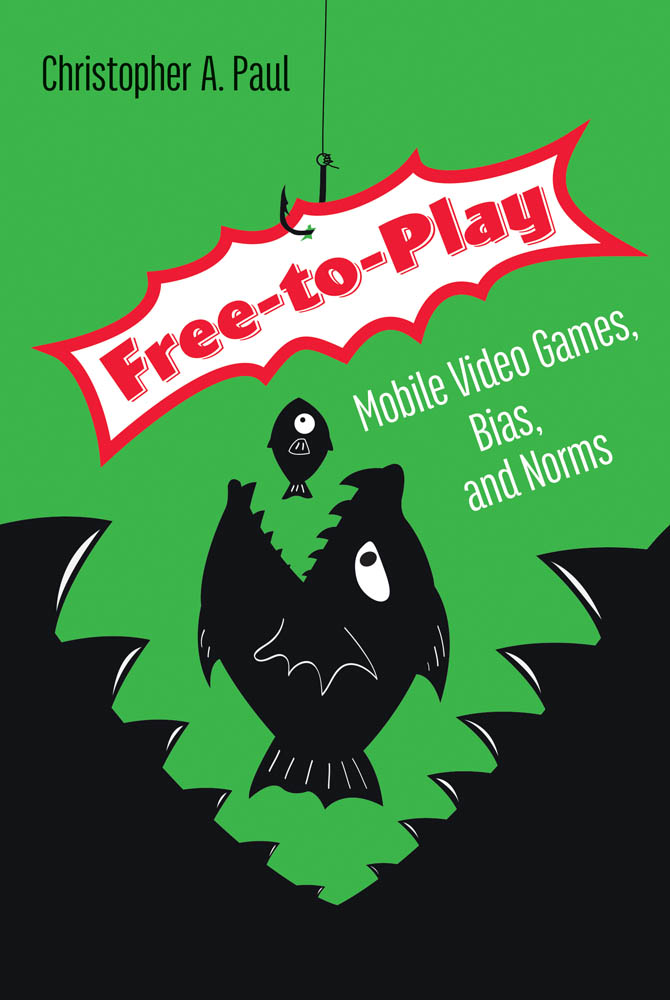Christopher A. Paul - Free-to-Play
Here you can read online Christopher A. Paul - Free-to-Play full text of the book (entire story) in english for free. Download pdf and epub, get meaning, cover and reviews about this ebook. publisher: MIT Press, genre: Romance novel. Description of the work, (preface) as well as reviews are available. Best literature library LitArk.com created for fans of good reading and offers a wide selection of genres:
Romance novel
Science fiction
Adventure
Detective
Science
History
Home and family
Prose
Art
Politics
Computer
Non-fiction
Religion
Business
Children
Humor
Choose a favorite category and find really read worthwhile books. Enjoy immersion in the world of imagination, feel the emotions of the characters or learn something new for yourself, make an fascinating discovery.

- Book:Free-to-Play
- Author:
- Publisher:MIT Press
- Genre:
- Rating:3 / 5
- Favourites:Add to favourites
- Your mark:
- 60
- 1
- 2
- 3
- 4
- 5
Free-to-Play: summary, description and annotation
We offer to read an annotation, description, summary or preface (depends on what the author of the book "Free-to-Play" wrote himself). If you haven't found the necessary information about the book — write in the comments, we will try to find it.
Free-to-Play — read online for free the complete book (whole text) full work
Below is the text of the book, divided by pages. System saving the place of the last page read, allows you to conveniently read the book "Free-to-Play" online for free, without having to search again every time where you left off. Put a bookmark, and you can go to the page where you finished reading at any time.
Font size:
Interval:
Bookmark:

Christopher A. Paul
The MIT Press
Cambridge, Massachusetts
London, England
2020 Massachusetts Institute of Technology
All rights reserved. No part of this book may be reproduced in any form by any electronic or mechanical means (including photocopying, recording, or information storage and retrieval) without permission in writing from the publisher.
Library of Congress Cataloging-in-Publication Data
Names: Paul, Christopher A., author.
Title: Free-to-play : mobile video games, bias, and norms / Christopher A. Paul.
Other titles: Free-to-play
Description: Cambridge, Massachusetts : The MIT Press, 2020. | Includes bibliographical references and index.
Identifiers: LCCN 2020002677 | ISBN 9780262539418 (paperback)
Subjects: LCSH: Video games--Economic aspects. | Video games industry.
Classification: LCC GV1469.3 .P38 2020 | DDC 794.8--dc23
LC record available at https://lccn.loc.gov/2020002677
d_r0
For Erin, Piper, Ingrid... and Mom and Dad
I really like to play games. I was fortunate enough to grow up with an Atari, then a Commodore 64, a Nintendo Entertainment System, and a Game Boy. Consoles and PCs, as well as board and card games, litter my childhood with memories of playing with family and friends. Games build memories and are touchstones that allow conversation about other topics. I have turned my lifelong appreciation for games into part of my job, for which I think, write, and speak about video games and how they work, what they mean, and why they matter. It is awesome.
It is striking to me how the games I play have changed over time, as my interests and resources have shifted. There was a time where I would wake up early to get unfettered access to the television to binge on Final Fantasy. For a couple of years, my life was punctuated by rushing home from work, warming up some food and spending the night raiding with my partner in World of Warcraft. I now field weekend requests from an eldest daughter who wakes up early to play games on the Nintendo Switch with me and says things like, I love that my Daddy likes video games. If he didnt like video games, it wouldnt be so much fun. We cruise through Marvel Ultimate Alliance 3 as my youngest grabs her controller, one she will soon be old enough to realize isnt connected to anything. Now I slot my game time around work, child care, and meetings, which leaves me primarily playing games on mobile devices. And it is in this last space where I find some of the most interesting things happening in video games.
As I have moved from buying the newest console or PC game at launch into a world where I only buy a premium title or three each year, my spending and playtime have shifted to free-to-play mobile games. I am now the kind of player who will pay to save time. I know that early money beats late and starting out with a medium-sized stake can put me in a position to reap the rewards of a higher place on the leaderboards. I dabble in new games, often buying starter packs just to see if I like what I find. I have gone so far as to buy premium currency in shady deals outside of the bounds of a games primary marketplace. For me, my time is more precious, and I use money to compensate for the time I dont have, continuing to play games, but different ones that better suit the life I have now. As my play and spending change, I continue to read and keep up on console and PC games, as well as coverage and discussion of the games I play now. I am unlikely to find the time to finish Red Dead Redemption even though I played through the first couple of missions, but I still find joy in reading about what is going on in video games and watching videos about flagship titles.
Using my perspective as someone with a deep history with video games, but with a positionality that has changed in recent years, offers space to analyze what is happening with free-to-play and mobile games. All too often certain kinds of games are dismissed and mocked, precisely when they are an increasingly prominent and important part of the video game industry. There are problems with the monetization structures of free-to-play games. There is also room to critique and address their game design and structure. However, until they are understood for what they are and are not, criticism of them is weak and far too often goes down a rabbit hole of red herrings.
Productive criticism is predicated on taking the object of analysis seriously. One should start with the premise that something interesting is happening and work from there. Although the mainstream game press has done an excellent job of reporting on the structural sexism at League of Legend developer Riot Games and the harsh working conditions at Rockstar Games in the lead-up to the launch of Red Dead Redemption, coverage of free-to-play and mobile games far too often devolves into deeply flawed analysis. To get to the same quality of analysis and reporting on free-to-play and mobile games, the structural biases against those games needs to be addressed and owned. This project is designed to help illustrate how those biases are enacted in an effort to start a credulous, nuanced criticism of free-to-play and mobile games. Articulating what is okay in mobile and free-to-play games and where the line is requires understanding these games on their own merits and why they are designed in a manner to do things like obscure the price of in-game goods or use advertising as a secondary, or occasionally primary, income stream. The first step in getting there is developing the background and context for mobile and free-to-play games within the broader scene of contemporary video games.
Mobile gaming has taken over the video game industry, as 2016 marked the year where the mobile sector overtook both consoles and PC games to be the largest segment of the video game market.
A key distinction in this different community of players is also that a substantial percentage of the mobile game industry is based on the Chinese market, which is the single most profitable one for mobile games. Tencents growth has been fueled by the ability to offer access to China for Western publishers, in combination with their dominance on Chinese social media through WeChat and QQ. This shift is often made more palatable by Tencents tendency to be quite hands-off with the companies they invest in, but the vital importance of the Chinese market is a key reason why mobile and free-to-play games signal new trends in video games.
Free-to-play and mobile games are changing what video games are because they are funded by a small percentage of players. Unlike traditional console or PC games, where the most typical case is for everyone to pay roughly the same amount for a game, excepting savings found on a deal or spending on a collectors edition, the vast majority of free-to-play spending comes from a small percentage of the player base. The flow of revenue is different in these games, which anchors into concerns about gambling, problem spending, and players paying to win rather than relying on their skill at play.
A final difference is that women are more valuable players than men, and women typically prefer to play different genres of games. In an analysis of the market, data analytics firm deltaDNA found that women were more likely to own a premium mobile handset, which makes them more invested in mobile as a platform. They also found a strong difference in the gender preference for the four categories of games they track, with men composing about three-quarters of the player base for action and strategy games, women accounting for about the same proportion of puzzle game players, and casino games being almost evenly split, with a slight preference shown by women. There is a long history of women playing and designing different genres of games, and excellent work has been done by Shira Chess and Anastasia Salter, among others, at demonstrating why that history matters. As deltaDNAs write up of the data notes, these trends have
Next pageFont size:
Interval:
Bookmark:
Similar books «Free-to-Play»
Look at similar books to Free-to-Play. We have selected literature similar in name and meaning in the hope of providing readers with more options to find new, interesting, not yet read works.
Discussion, reviews of the book Free-to-Play and just readers' own opinions. Leave your comments, write what you think about the work, its meaning or the main characters. Specify what exactly you liked and what you didn't like, and why you think so.








